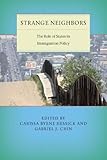Strange Neighbors : The Role of States in Immigration Policy / ed. by Gabriel J. Chin, Carissa Byrne Hessick.
Material type: Computer fileSeries: Citizenship and Migration in the Americas ; 6Publisher: New York, NY : New York University Press, [2014]Copyright date: ©2014Description: 1 online resourceContent type:
Computer fileSeries: Citizenship and Migration in the Americas ; 6Publisher: New York, NY : New York University Press, [2014]Copyright date: ©2014Description: 1 online resourceContent type: - 9780814764862
- Emigration and immigration law -- States -- United States
- Emigration and immigration law -- United States
- Emigration and immigration law -- United States -- States
- Emigration and immigration law -- United States
- Exclusive and concurrent legislative powers -- United States
- Exclusive and concurrent legislative powers -- United States
- States' rights (American politics) -- United States
- States' rights (American politics)
- LAW / General
- 325.73 23
- online - DeGruyter
| Item type | Current library | Call number | URL | Status | Notes | Barcode | |
|---|---|---|---|---|---|---|---|
 eBook
eBook
|
Biblioteca "Angelicum" Pont. Univ. S.Tommaso d'Aquino Nuvola online | online - DeGruyter (Browse shelf(Opens below)) | Online access | Not for loan (Accesso limitato) | Accesso per gli utenti autorizzati / Access for authorized users | (dgr)9780814764862 |
restricted access online access with authorization star
http://purl.org/coar/access_right/c_16ec
Since its founding, the U.S. has struggled withissues of federalism and states’ rights. In almost every area of law, fromabortion to zoning, conflicts arise between the states and the federalgovernment over which entity is best suited to create and enforce laws. In thelast decade, immigration has been on the front lines of this debate, withstates such as Arizona taking an extremely assertive role in policingimmigrants within their borders. While Arizona and its notorious SB 1070 is themost visible example of states claiming expanded responsibility to make andenforce immigration law, it is far from alone. An ordinance inHazelton, Pennsylvania prohibited landlords from renting to the undocumented. Severalstates have introduced legislation to deny citizenship to babies who are bornto parents who are in the United States without authorization. Other stateshave also enacted legislation aimed at driving out unauthorized migrants.Strange Neighbors explores the complicated and complicating roleof the states in immigration policy and enforcement, including voices from bothsides of the debate. While many contributors point to the dangers inherent instate regulation of immigration policy, at least two support it, while othersoffer empirically-based examinations of state efforts to regulate immigrationwithin their borders, pointing to wide, state-by-state disparities inlocally-administered immigration policies and laws. Ultimately, the book offersan extremely timely, thorough, and spirited discussion on an issue that willcontinue to dominate state and federal legislatures for years to come.
Mode of access: Internet via World Wide Web.
In English.
Description based on online resource; title from PDF title page (publisher's Web site, viewed 26. Mrz 2024)


